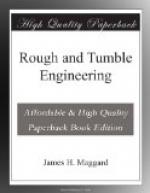Q. How would you find the approximate weight of a boiler by measurement? A. Find the number of square feet in surface of boiler and fire box, and as a sheet of boiler iron or steel 1/16 of an inch thick, and one foot square, weighs 2.52 pounds, would multiply the number of square feet by 2.52 and this product by the number of 16ths or thickness of boiler sheet, which would give the approximate, or very near the weight of the boiler.
Q. What would you recognize as points in a good engineer. A. A good engineer keeps his engine clean, washes the boiler whenever he thinks it needs it. Never meddles with his engine, and allows no one else to do so. Goes about his work quietly, and is always in his place, only talks when necessary, never hammers or bruises any part of his engine, allows no packing to become baked or burnt in the stuffing box or glands, renews them as quick as they show that they require it. Never neglects to oil, and then uses no more than is necessary. He carries a good gauge of water and a uniform pressure of steam. He allows no unusual noise about his engine to escape his notice he has taught his ear to be his guide. When a job is about finished you will see him cleaning his ash pan, getting his tools together, a good fire in fire box, in fact all ready to go, and he looses no time after the belt is thrown off. He hooks up to his load quietly, and is the first man ready to go.
Q. When the piston head is in the exact center of cylinder, is the engine on the quarter? A. It is supposed to be, but is not.
Q. Why not? A. The angularity of the rod prevents it reaching the quarter.
Q. Then when the engine is on the exact quarter what position does the piston head occupy? A. It is nearest the end next to crank.
Q. If this is the case, which end of cylinder is supposed to be the stronger? A. The opposite end, or end furtherest from crank.
Q. Why? A. Because this end gets the benefit of the most travel, and as it makes it in the same time, it must travel faster.
Q. At what part of the cylinder does the piston head reach the greatest speed? A. At and near the center.
Q. Why? Figure this out for yourself. Note. The above few questions are given for the purpose of getting you to notice the little peculiarities of the crank engine, and are not to be taken into consideration in the operation of the same.
Q. If you were on the road and should discover that you had low water, what would you do? A. I would drop my load and hunt a high place for the front end of my engine, and would do it quickly to.
Q. If by some accident the front end of your engine should drop down allowing the water to expose the crown sheet, what would you do? A. If I had a heavy and hot fire, would shovel dirt into the fire and smother it out.
Q. Why would you prefer this to drawing the fire? A. Because it would reduce the heat at once, instead of increasing it for a few minutes while drawing out the hot bed of coals, which is a very unpleasant job.




